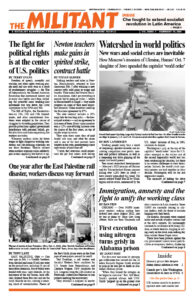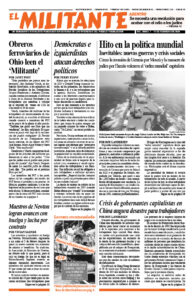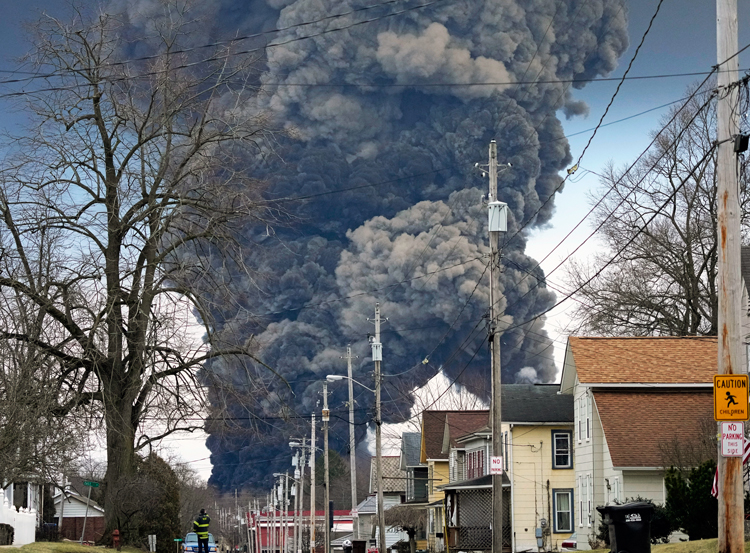EAST PALESTINE, Ohio — One year ago on Feb. 3 a Norfolk Southern train derailed and some 50 rail cars went on the ground here, including 11 cars of hazardous chemicals, five of which were loaded with toxic vinyl chloride. At the insistence of the rail bosses, local officials drained those five cars and set the vinyl chloride on fire, creating a towering cloud of contamination. Photos of the fire’s black plume were on the front page of newspapers around the world.
Ved Dookhun, a rail worker and Socialist Workers Party candidate for U.S. Senate from Pennsylvania, and Candace Wagner, SWP candidate for U.S. Congress from the 12th District in Pittsburgh, visited East Palestine to join protests marking the anniversary.
They attended a program in nearby Columbiana that included videos and presentations on the extent of chemical contaminants spread across the area, as well as fights against other toxic disasters in the region. Alisha Lange from Piqua, Ohio, told Dookhun about the fight working people in her community are waging against city authorities allowing companies to burn lithium batteries outside on a concrete pad near the Great Miami River.
“It’s been going on for five years,” she said. “The companies that did the burns were paid tens of thousands of dollars for each one, and the city government got paid off too.
“Because of our protests, they’ve stopped the burns for now. But we felt defeated because we weren’t getting real testing done,” she said. “Then we looked at the fight they’ve waged in East Palestine and saw power in numbers. That’s why I drove four hours to be here.”
“We salute the people of East Palestine,” Dookhun said. “They’ve fought to get answers, and questioned the ones they’ve been given by the Environmental Protection Agency and the railroad.
‘Workers control over production’
“The disaster in East Palestine is directly connected to the rail bosses’ drive to run longer and longer trains; lay off workers, including track inspectors; and to cut crew sizes — all to jack up the profit rate,” he said. “And the government agencies work hand in hand with all the bosses.
“I worked in the coal mines earlier and the federal mine inspectors would tell the mine management when they were coming to inspect,” Dookhun added. “Then we’d be instructed to do a massive cleanup and then the company would promise to ‘fix’ whatever problems remained. All of these government agencies work hand in glove with the companies.”
“Yes, if we don’t fight, the EPA and the companies will continue to cover up the dangers of what they do,” Lange said.
“My campaign points to the need for workers and our unions to take control of production and transportation,” Dookhun explained. “We know what’s safe for ourselves and for the public. We can fight together.
“It was very important that rail union officers came to East Palestine in June and testified at the National Transportation Safety Board hearings, detailing the impact of the rail bosses’ profit drive,” he added. “They made the connection between the fight of the residents of the area and that of rail workers for safe conditions. We need the power of the unions. We urge unions to get involved in these fights.”
When Dookhun told Lange that flight attendants would be protesting in Cleveland Feb. 13, to demand a new contract, she expressed interest in going and telling them about the fights in Piqua and East Palestine. She subscribed to the Militant.
That evening, Dookhun, Wagner and SWP campaign supporters took part in an event at McKim’s Honeyvine and Winery across the road from the site of the derailment. They spoke with central activists in the East Palestine fight they knew and met others.
“I hear you’re throwing your hat into the ring,” former Militant subscriber Linda Murphy told Wagner. “Yes, I am. I’m the SWP candidate for Congress.
“You’ll be glad to know we’re demanding the Democrats drop all the charges they’ve filed against Donald Trump, and we defend his right to be on the ballot,” Wagner said. “If the Democrats attack Trump’s constitutional rights, we can be sure they’ll go after my party and the unions.”
Earlier in the day, Wagner and this Militant worker-correspondent visited other fighters SWP members had met in the area over the last year, including Mallory Aponick, from Darlington, Pennsylvania. They discussed the murderous Oct. 7 Hamas pogrom against Jews in Israel and events there since. She agreed that Hamas is a terrorist organization, but said she was concerned about the number of children dying in Gaza.
“Hamas does not act in the interests of the Palestinians,” Wagner said. “They are for the destruction of Israel, and they use the people of Gaza as human shields. Hamas has to be destroyed for the future of the Palestinian people, as well as for the Jews and others in the region.”
Aponick agreed that working people and small farmers should take power to save humanity, but debated whether that’s possible. “I saw anarchists in action when I participated in a protest in Pittsburgh,” she said. “They just wanted to destroy small businesses.”
“To be successful we need a working-class leadership,” I explained. “We need a party that views every question as a class question, where do our interests lie. The revolution made by Cuban workers and peasants is an example. They had a leadership worthy of their struggles. They took power and built a society based on human solidarity.”
Aponick also plans to come with SWP campaigners to the flight attendants’ picket in Cleveland. She bought a Militant subscription and a copy of The Low Point of Labor Resistance Is Behind Us: The Socialist Workers Party Looks Forward by SWP leaders Jack Barnes, Mary-Alice Waters and Steve Clark.
Dookhun and Wagner spoke at a Militant Labor Forum in Pittsburgh Feb. 4. Dookhun described the fighting spirit of people they talked to in East Palestine. They’re a good omen for bigger struggles to come, he said, and for the SWP campaign in 2024.


